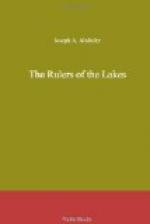“I think,” said Willet, “that he’s getting ready to lead a band against the border, now almost defenseless.”
“He is a bad man,” said Tayoga. “His soul is full of wickedness and cruelty, and it should be sent to the dwelling place of the evil minded. If Great Bear and Dagaeoga say the word I will creep through the thickets and kill him.”
Robert glanced at him. The Onondaga had spoken in the gentle tones of one who felt grief rather than anger. Robert knew that his heart was soft, that in ordinary life none was kinder than Tayoga. And yet he was and always would be an Indian. De Courcelles had a bad mind, and he was also a danger that should be removed. Then why not remove him?
“No, Tayoga,” said Willet. “We can’t let you risk yourself that way. But we might go a little closer without any great danger. Ah, do you see that new figure passing before the blaze?”
“Tandakora!” exclaimed the white youth and the red youth together.
“Nobody who knows him could mistake him, even at this distance. I think he must be the biggest Indian in all the world.”
“But a bullet would bring him crashing to earth as quickly as any other,” said the Onondaga.
“Aye, so it would, Tayoga, but his time hasn’t come yet, though it will come, and may we be present when your Manitou deals with him as he deserves. Suppose we curve to the right through these thick bushes, and from the slope there I think we can get a much better view of the band.”
They advanced softly upon rising ground, and being able to approach two or three hundred yards, saw quite clearly all those around the fire. The white man was in truth De Courcelles, and the gigantic Indian, although there could have been no mistake about him, was Tandakora, the Ojibway. The warriors, about thirty in number, were, Willet thought, a mingling of Ojibways, Pottawattomies and Ottawas. All were in war paint and were heavily armed, many of them carrying big muskets with bayonets on the end, taken from Braddock’s fallen soldiers. Three had small swords belted to their naked waists, not as weapons, but rather as the visible emblems of triumph.
As he looked, Robert’s head grew hot with the blood pumped up from his angry heart. It seemed to him that they swaggered and boasted, although they were but true to savage nature.
“Easy, lad,” said Willet, putting a restraining hand upon his shoulder. “It’s their hour. You can’t deny that, and we’ll have to bide a while.”
“But will our hour ever come, Dave? Our army has been beaten, destroyed. The colonies and mother country alike are sluggish, and now have no plans, the whole border lies at the mercy of the tomahawk and the French power in Canada not only grows all the time, but is directed by able and daring men.”
“Patience, lad, patience! Our strength is greater than that of the foe, although we may be slower in using it. But I tell you we’ll see our day of triumph yet.”




